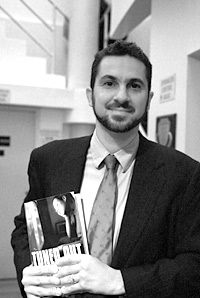Lecture: David Mindich

David Mindich at NYU.
Photo: Hazuki Aikawa.
RELATED:
"More than values, Bush won because his supporters were uninformed," David Mindich told a group of students in NYU's journalism department on November 9, 2004. In Mindich's opinion there's "something more important than one election, and that's the long term decline in news consumption."
Mindich should know. In his just-published book, Tuned out: Why Americans Under 40 Don't Follow the News, he confronts that decline, head-on. "I think this election is really a taste of what can [happen] when we have a tuned-out electorate," he said. No matter what party runs the government, there needs to be a check on this power, especially if one party has control of the house and the presidency, said Mindich. Despite the system of checks and balances built into American democracy, he argued, the ultimate check is "you, the informed citizenry, informed by a free and aggressive press."
Mindich shared some anecdotal evidence. When he and his son walked through the Montpelier State House, in Vermont, his son started acting nervous, wondering if they were supposed to be there. "I said 'Excuse me, sir [to a man walking by], are we allowed to be in here?,'" Mindich recalled. "And he said something that I still find so beautiful. He said, 'Of course, it's your house." This moment touched him because he feels many young people lack that sense of ownership, when it comes to government. "Part of it is, people are not informed enough about their house," Mindich said.
"News has shrunk on the television dial," said Mindich. "Dan Rather can't compete with Fear Factor." Even so, some newscasts try. Nakednews.com's female anchors strip while reading the news. "It undresses, but it does not uncover," quipped Mindich.
According to Mindich, this sense of disengagement, even alienation, from government and the political process has resulted in a decreasing interest, among Americans under 40, in the news. In his book, he notes that in 1972, half of college students read a newspaper; today, only one-fifth of college students read the paper. Worse yet, this decline in news consumption is not limited to college students, but among 30-year-olds as well, an age that Mindich had expected would be following the news.
Not only are young people not reading newspapers, they're not watching TV news, either. According to Mindich, the average age of television news viewers is 60; 10 years ago it was 50. He challenged those who did not believe this statistic to watch the evening news, especially the commercials during it. "The commercials reveal who your audience is, and to look at the Viagra, Depends, [and] Metamucil commercials, it's like opening up an old couple's medicine cabinet," Mindich said.
In his book, Mindich asks what effect the Internet has on young people, since people commonly overestimate the amount of news young people consume from the Internet. However, when 18-to-30-year-olds were asked, in a recent National Geographic poll, what their main source of news was, only 11 percent said that it was the Internet.

Mindich speaking in the atrium of NYU’s Journalism department.
Photo: Hazuki Aikawa. © Hazuki Aikawa,†2004.
For Mindich, reading nothing but capsule summaries of the day's top stories, as some news consumers do when they get their news online, is a problem. "If you only understand a broad outline, and maybe not even a broad outline, of what politicians are doing...and what their signature legislation is," he said, "then you can't hold your leaders accountable by contrasting their words with the facts."
Young people were not always tuned out to the news. "In the '40s, '50s, '60s, [and] '70s, studies have shown, young people...were nearly as tuned in as their elders," Mindich said.
Alarmed by these statistics, Mindich decided to interview young people around the country. Defining young people as anyone under 40, he went to Kansas City, Brandeis University, New Orleans, and Los Angeles in an attempt to interview different people from various backgrounds. "I know the sample isn't very large, but it makes [for] an eclectic [range of people]," he said.
When analyzing the decline in news consumption among young people, said Mindich, it's important to reject two reasons, right out of the gate. First, it's "not because young people are stupid" that they're seemingly unconcerned with the news. Nor is it that they're less thoughtful, he argued. "It was not the young people of today who started the trend," said Mindich. Rather, it began in the 50's, with the introduction of television and the decline of party affiliation over the past 40 years, following the decline of political participation.
Why, then, according to Mindich's research, can only 17%of Americans name three or more Supreme Court Justices, while 57 percent can name all of the Three Stooges? "Entertainment is definitely part of it," said Mindich.
"News has shrunk on the television dial," he noted. In the 1960s, in New York, there were only seven channels to choose fromó"three news choices, a public affairs show, and repeats of F Troop and I Love Lucy," according to Mindich's book. In those days, Mindich argued, TV viewers were more likely to encounter news-related programming.
Things have changed, asserted Mindich. "Dan Rather can't compete with Fear Factor," said Mindich. "News can't compete with the entertainment value in entertainment." Even so, some newscasts try. The limit case in pandering, he suggests, is the notorious Nakednews.com, an online news program whose all-female cast of anchors strips while reading the news. The show "reads, but it does not report," said Mindich. "It undresses, but it does not uncover. It's a show dog, not a watchdog."

David Mindich talking with NYU Journalism students.
Photo: Hazuki Aikawa. © Hazuki Aikawa,†2004.
Since real news can't compete with stripping anchorbabes, Mindich offers saner solutions to the problem of audience exodus. Intriguingly, he held up the Fox News Channel as an example of a smart take-back-the-audience strategy. In Mindich's opinion, it's not the right-wing polemics that make the network successful, but the fact that "the people on Fox seem to really care about the politics they cover." Likewise, said Mindich, the hugely popular "fake news" anchor and political comedian Jon Stewart seems to care about what he covers, as well.
Old-school journalists who abide by the doctrine of objectivity "tend to act in a detached, sometimes almost robotic way," noted Mindich. "I think you can be nonpartisan but still really care about what you're talking about. Objectivity should be rethought."
Another solution, he suggested, is "to think about the occasional reader." By this, he meant the person who is reading about a given issue for the first time. "Journalists can offer more roadmaps," such as sidebars or Internet links, which can provide the uninitiated with background information, Mindich said.
In his dreams, educators would take a more active role in fostering media literacy among young people.
For example, he wondered, why isn't there a required CSAT test? Such a college admissions test would be like the SAT but would be focused on civic issues and current events rather than reading, writing, math, and the more traditional subjects tested by the SAT.
Finally, he argued, lobbying the FCC for more news programming for children may be another solution to the decline in news consumption by youth.
Besides offering solutions for increasing young people's news understanding, Mindich said that no matter what, journalists and news consumers alike must remain vigilant, holding elected leaders accountable for their actions. We have to embrace a paradox, he said, namely, "To be skeptical of the government, you have to trust, to some extent, the information that we get" from the newsmedia. He cited a recent poll that showed that more of the people polled trust the military than trust the media. "That's a dangerous thing, because we need to hold the military accountable, the president accountable," said Mindich. "We need the news, because our democracy depends on it."

